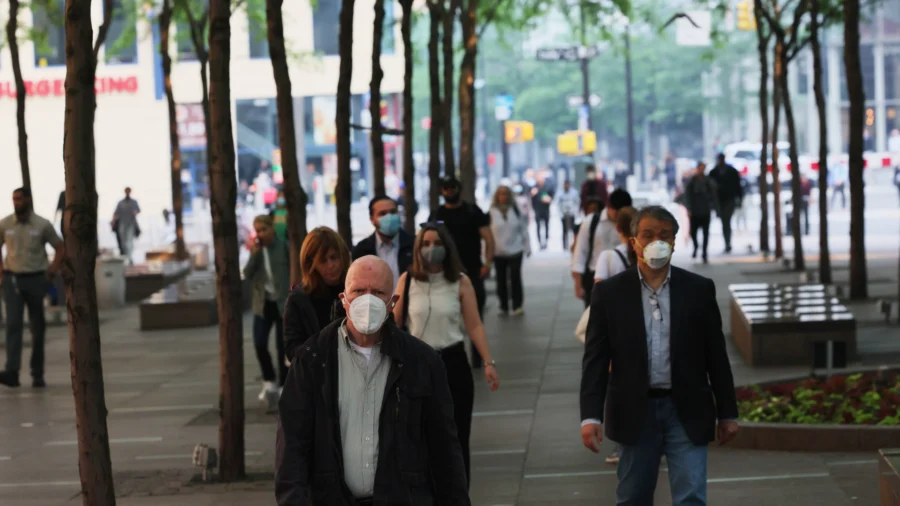The American Psychological Association (APA) has said that the country is still reeling from the impact of COVID-19 lockdowns and other aspects of the pandemic as Americans have suffered a “collective trauma.”
While the national health emergency due to the COVID-19 outbreak officially came to an end on May 11, 2023, in some ways the country hasn’t returned to “normal.”
In a study seeking to gauge stress levels among Americans, APA concluded that there are “signs of collective trauma among all age cohorts” in the United States.
“The COVID-19 pandemic created a collective experience among Americans. While the early-pandemic lockdowns may seem like the distant past, the aftermath remains,” Arthur C. Evans Jr., APA’s chief executive officer, said in a statement.
The study found that adults between the ages of 34 and 44 reported the biggest surge in chronic health conditions since the pandemic, rising from 48 percent in 2019 to 58 percent in 2023.
The same age group also experienced the biggest jump in mental health illnesses, chiefly anxiety and depression. These rose from 31 percent in 2019 to 45 percent in 2023, according to the study.
Chronically elevated levels of stress create risks for various mental health challenges and wear down the immune system, APA said. The association noted that the data suggest that long-term stress sustained since the outbreak of the COVID-19 pandemic has had a significant impact on Americans’ well-being.
“We cannot ignore the fact that we have been significantly changed by the loss of more than one million Americans, as well as the shift in our workplaces, school systems, and culture at large,” Mr. Evans said. “To move toward posttraumatic growth, we must first identify and understand the psychological wounds that remain.”
Chronic stress can cause inflammation, breaking down the immune system and raising the risk of all sorts of ailments, including stroke and heart disease, APA warned.
The study is the latest that suggests the heavy-handed response to the outbreak, which included school closures, business shutdowns, and near-universal mask-wearing, has had a negative impact on people’s physical and mental health.
Lockdowns and Explosion of Child Gun Deaths
Recent research on child gun deaths adds heart-wrenching evidence to the growing pile of data suggesting that COVID-19 lockdowns and other restrictions had a devastating impact on society.
The study, authored by researchers from Boston Children’s Hospital and published on Oct. 5 in a journal of the American Academy of Pediatrics, found that injury-related deaths among children rose sharply during the pandemic years 2020-2021.
The spike in pediatric fatal injuries was driven by drugs and injuries involving firearms.
In 2021, when lockdowns and other COVID-19 restrictions were pervasive, more child homicides (2,279) and suicides (1,078) by gun were recorded than in any year since 1999, per the study.
Some see a clear causal link between the explosion in child gun deaths and pandemic lockdown policies, which other studies have linked to a variety of negative outcomes including delayed health treatments, learning loss, and mental health crises.
“Due to lockdowns and other misconceived pandemic policies, child gun deaths in the United States exploded exponentially in 2020,” wrote Kevin Bass, a researcher and PhD student in medicine, said in a post on X.
While the study shows that firearm-related homicides began rising in 2018, Mr. Bass said that it’s “very clear that the huge leap to record levels occurred between 2019 and 2020, which is when lockdowns happened.”
The study’s findings dovetail with an April 2023 report from the Pew Research Center, which found that the number of children and teenagers killed by gunfire surged by 50 percent between 2019 and 2021.
Some studies have identified lockdowns as contributing to jumps in suicides, mental health crises, learning loss, and delayed health treatments.
Other studies have suggested that lockdowns worked to stem the spread of the virus.
“Our results show that major non-pharmaceutical interventions—and lockdowns in particular—have had a large effect on reducing transmission,” wrote the authors of the study backing restrictive measures, though the research did not evaluate any other unintended impacts of the measures.
But one recent study that looked at a wide array of research into lockdowns concluded that such measures can be an effective tool in controlling the COVID-19 pandemic but only if “long-term collateral damage is neglected.”
“The price tag of lockdowns in terms of public health is high: by using the known connection between health and wealth, we estimate that lockdowns may claim 20 times more life years than they save,” the study’s authors wrote.
The authors also said that what deserves a “special and urgent analysis” is the question of “to what extent, why, and how the dissenting (disapproved by healthcare officials) scientific opinions were suppressed during COVID-19.”
“Suppression of ‘misleading’ opinions causes not only grave consequences for scientists’ moral compass; it prevents the scientific community from correcting mistakes and jeopardizes (with a good reason) public trust in science,” they wrote.
From The Epoch Times


